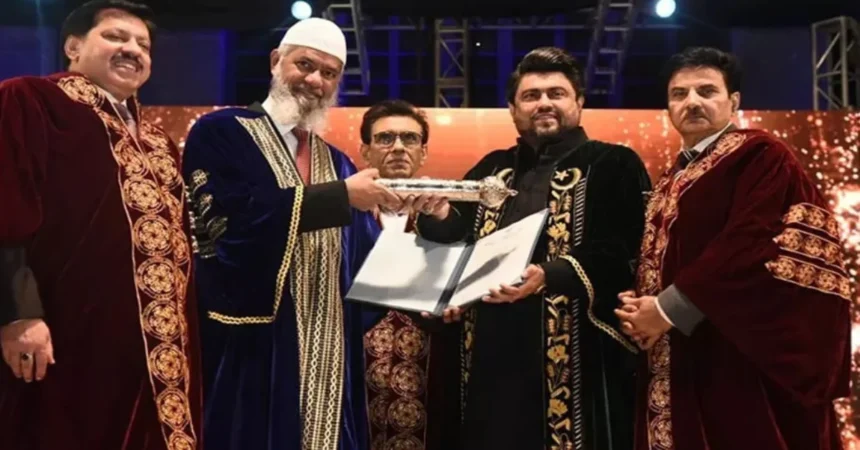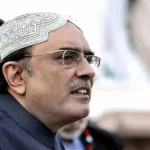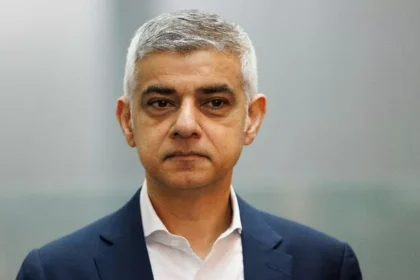Introduction
In a significant event that has garnered both praise and criticism, the University of Karachi awarded an honorary doctorate to Dr. Zakir Naik, a prominent Islamic preacher and founder of the Islamic Research Foundation (IRF). This honor highlights the university’s recognition of Dr. Naik’s contributions to education and interfaith dialogue, alongside the controversies that have surrounded his public life. The decision to award him this honor has ignited discussions about the responsibilities of educational institutions and the role of religious leaders in society.
- Introduction
- Background of Dr. Zakir Naik
- The Award Ceremony
- Reasons for the Honorary Doctorate
- Controversies Surrounding Dr. Zakir Naik
- The Role of Educational Institutions
- Public Reactions
- Implications for Karachi University
- Religious Tolerance and Pluralism:
- Youth and Education
- Navigating Religious Discourse
- Future Implications for Pakistani Society
Background of Dr. Zakir Naik
Dr. Zakir Naik, born on October 18, 1965, in Mumbai, India, is a renowned Islamic scholar, orator, and author. He is best known for his ability to articulate Islamic principles and provide compelling arguments in favor of the faith during public lectures and debates. Naik founded the Islamic Research Foundation (IRF) in 1991 with the aim of promoting a better understanding of Islam through educational initiatives, public lectures, and debates.
Over the years, Dr. Naik has gained a massive following globally, particularly among young Muslims, due to his articulate presentations on Islamic principles and their alignment with contemporary issues. His lectures, which often include Q&A sessions, have been broadcast on television and the internet, reaching millions of viewers. His ability to engage with diverse audiences and tackle complex theological questions has solidified his position as a leading figure in Islamic scholarship.
The Award Ceremony
The award ceremony took place at Karachi University, where several dignitaries, scholars, and students were in attendance. The Vice-Chancellor of the university presented the honorary doctorate, emphasizing Dr. Naik’s influence in the field of religious discourse and his commitment to educating people about Islam. The event was marked by speeches celebrating his achievements and contributions to society.
During the ceremony, various speakers praised Dr. Naik’s dedication to fostering interfaith dialogue and his efforts to promote a more profound understanding of Islam in a world often marked by misunderstanding and conflict. The audience was treated to a video montage highlighting Dr. Naik’s significant contributions to education and community engagement, showcasing his work in addressing pressing social issues through an Islamic lens.
Reasons for the Honorary Doctorate
The university’s decision to honor Dr. Naik stems from several factors:
1. Promotion of Islamic Education: Dr. Naik has made significant efforts to promote Islamic teachings worldwide, contributing to a greater understanding of the faith among both non-Muslims and Muslims. His work emphasizes the importance of education in fostering a peaceful society.
2. Interfaith Dialogue: His approach to interfaith discussions has opened up avenues for dialogue between different religious communities. Naik often emphasizes the commonalities among major religions, which can foster peace and understanding. This commitment to dialogue is crucial in today’s polarized world, where religious intolerance can lead to conflict.
Controversies Surrounding Dr. Zakir Naik
Despite his contributions, Dr. Naik has faced significant scrutiny and criticism over the years. Some controversies include:
1. Allegations of Extremism: Critics argue that some of his statements have promoted radical interpretations of Islam. This has led to concerns about the potential influence of his teachings on young audiences. Opponents often cite specific quotes and contexts to argue that Naik’s rhetoric can be interpreted as extremist, raising alarms about the impact of his teachings on susceptible individuals.
2. Legal Issues: Dr. Naik has faced legal challenges in several countries, including India, where he has been accused of promoting communal disharmony and being linked to terrorist activities. He has denied all allegations and maintains that his teachings are peaceful and aimed at spreading knowledge. The legal cases against him have sparked debates about freedom of speech and the responsibilities of public figures in their discourse.
3. Mixed Public Reception: The decision to award him an honorary doctorate has elicited mixed reactions from the public and academic circles. Supporters argue that his contributions to Islamic education and interfaith dialogue warrant recognition, while critics believe that honoring him could send the wrong message about the university’s stance on religious extremism.
4. Public Statements: Some of Naik’s public statements have been deemed controversial, leading to calls for universities and institutions to reconsider their affiliations with him. These statements often fuel debates about the intersection of religion and politics, and the potential consequences of inflammatory rhetoric.
The Role of Educational Institutions
The decision to award Dr. Zakir Naik an honorary doctorate is significant for Karachi University and the broader academic community. It raises several questions about the role of universities in honoring individuals with controversial backgrounds:
1. Academic Freedom vs. Responsibility: Universities often face the challenge of balancing academic freedom with social responsibility. By honoring Dr. Naik, Karachi University may be perceived as endorsing his views, which could have implications for its reputation. This tension between academic freedom and societal values is a critical consideration for educational institutions.
2. Engagement with Controversial Figures: The award opens up discussions about the importance of engaging with controversial figures in academia. While some argue that exposure to diverse viewpoints is essential for intellectual growth, others caution against legitimizing individuals whose views may contribute to societal divisions. The challenge lies in fostering an environment where differing opinions can be discussed constructively.
Public Reactions
The public’s reaction to the award has been polarized:
1. Support from Followers: Many of Dr. Naik’s supporters have praised the university for recognizing his contributions. They argue that his efforts to promote Islam and engage in interfaith dialogue are commendable and deserving of acknowledgment. Supporters view the award as a validation of Naik’s positive impact on the Muslim community and his efforts to promote understanding among different faiths.
2. Criticism from Opponents: Conversely, critics have voiced concerns about the potential implications of such an award. Some have called for the university to reconsider its decision, fearing it may undermine efforts to combat extremism and promote moderate interpretations of Islam. Critics argue that honoring Naik sends a message that the university condones extremist rhetoric, potentially alienating students and faculty who hold different views.
3. Media Coverage: The media has played a crucial role in shaping public perception of the event. Coverage has ranged from celebratory articles highlighting Dr. Naik’s achievements to critical reports questioning the appropriateness of the honor. Media narratives can influence public opinion and impact the university’s reputation, making it essential for institutions to manage their public relations effectively.
Implications for Karachi University
The decision to award Dr. Naik an honorary doctorate has significant implications for Karachi University:
1. University Policy Review: The award may prompt a review of the university’s policies regarding honorary degrees and the criteria for awarding them. Institutions may need to establish clearer guidelines for evaluating candidates with controversial backgrounds to ensure a consistent and principled approach.
2. Dialogue on Religious Studies: The controversy surrounding the award may lead to a renewed focus on the importance of religious studies within the academic curriculum. Universities may encourage discussions on religious tolerance, critical thinking, and the role of faith in contemporary society.
3. Impact on Future Events: The university may face increased scrutiny in its future events and award ceremonies, with stakeholders closely monitoring the choices made regarding honorees. This scrutiny can lead to more cautious decision-making in the future, potentially stifling bold initiatives in recognizing individuals for their contributions.
Religious Tolerance and Pluralism:
The decision reflects the ongoing struggle for religious tolerance and pluralism in a diverse society. Engaging with differing viewpoints is essential for fostering an inclusive environment where people of various beliefs can coexist peacefully.
Youth and Education
Dr. Naik’s influence on the youth is particularly noteworthy in a country where the younger generation comprises a significant portion of the population. The emphasis on education and empowerment through knowledge is critical for shaping the future of Pakistan. By engaging with youth, Dr. Naik aims to instill a sense of identity, purpose, and understanding of Islamic principles.
1. Youth Empowerment: Naik’s lectures often encourage young people to actively seek knowledge, understand their faith, and contribute positively to society. His teachings emphasize the importance of education as a means of empowerment, urging youth to engage critically with their surroundings.
2. Promotion of Critical Thinking: By challenging misconceptions about Islam and addressing contemporary issues, Dr. Naik encourages youth to think critically about their beliefs and the world around them. This critical engagement is essential for developing informed citizens capable of navigating complex societal dynamics.
3. Creating Role Models: Dr. Naik’s prominence serves as a model for young Muslims who aspire to articulate their beliefs confidently. His ability to engage in debates and discussions provides a blueprint for youth to become advocates for their faith while fostering a spirit of inquiry and learning.
4. Addressing Social Issues: Dr. Naik often addresses pressing social issues within the context of Islamic teachings, providing insights into topics such as justice, equality, and compassion. By doing so, he encourages youth to engage with these issues from an Islamic perspective, promoting active citizenship and social responsibility.
Navigating Religious Discourse
The award to Dr. Naik raises important questions about the nature of religious discourse in Pakistan:
1. Interfaith Engagement: The necessity for interfaith dialogue cannot be overstated. Engaging with diverse religious perspectives fosters a culture of understanding and respect. Naik’s approach has aimed to bridge gaps between different faiths, albeit with varying levels of success.
2. Constructive Criticism: While it is essential to recognize the positive contributions of figures like Dr. Naik, it is equally important to engage in constructive criticism. Open discussions about controversial figures can lead to better understanding and the evolution of ideas within religious contexts.
Future Implications for Pakistani Society
The ramifications of Karachi University’s decision extend beyond academia and into broader societal contexts:
1. Societal Divisions: The mixed reactions to the award could exacerbate existing divisions within society. It is crucial for community leaders and educators to work towards unity and understanding, especially in a diverse country like Pakistan.
2. Civic Engagement: The decision may inspire more people to engage in discussions about the role of religion in public life. Promoting civic engagement and dialogue among citizens can lead to a more informed populace capable of addressing societal challenges collaboratively.
#DrZakirNaik#KarachiUniversity#HonoraryDoctorate#InterfaithDialogue#IslamicEducation#YouthEmpowerment#ReligiousTolerance#Pakistan







